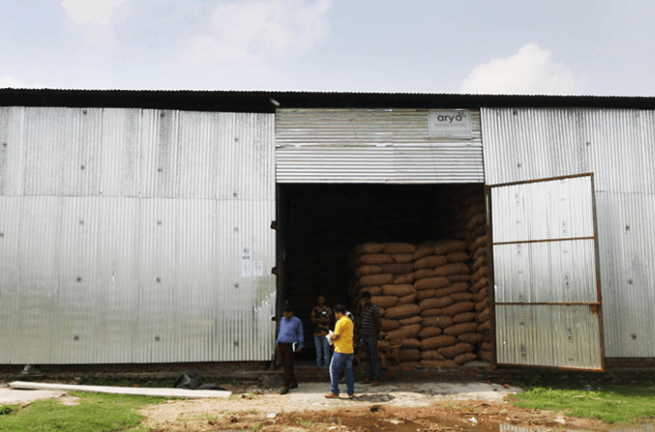Delhi-based Arya launched seven years ago as a logistics and warehousing venture for India’s smallholder grain farmers.
The company’s aim was to curb food waste while boosting farmer incomes, by giving growers a place to store their harvests until peak sales periods had passed and prices increased.
But it was Arya’s farmer financing solution that caught the attention of impact-focused fintech investor Quona Capital.
“Because farming is so seasonal in nature, it’s important that farmers have access to a combination of tools that address their needs, from affordable and timely financing, to efficiencies in warehousing and storage, to better pricing for inputs,” Quona co-founder and partner Ganesh Rengaswamy told AFN.
“Arya does all of these things in a digital-first platform that has the potential to drive the future of farming in India.”
Quona led Arya’s $21 million Series B equity and debt round, announced this week. Existing investors Ominvore and LGT Lightstone Aspada also backed the round, with several unnamed lenders provided debt financing.
The investment follows Arya’s $6 million pre-Series B round in March.
Farm meets finance
Back in 2013, Arya founders Prasanna Rao and Anand Chandra spotted a glaring inequity in India’s agriculture market. The majority of the country’s annual grain yield was being lost simply because smallholder farmers didn’t have access to the types of logistics and storage that larger-scale growers did. Those losses amounted to significant food waste, as well as lost income for growers. Farmers whose product did make it to market typically had to sell at harvest time, when prices were lowest.
Rao and Chandra sought to solve the waste problem by improving access to grain storage facilities. But to do so, they also needed to fix another issue: helping farmers cover their cash flow needs between harvest and sales.
“Imagine asking a farmer not to sell her produce after harvest and instead store it. This would choke her cashflows,” Rao told AFN.
“Finance is needed to release farmers’ need for cash, if they are to participate in value chains and not sell in distress immediately after harvest.”
Arya offers a type of inventory financing based on warehouse receipts. When farmers bring their produce to Arya’s facilities, the startup issues a loan for roughly 70% of the value of their crop. Farmers then repay the loan when they eventually sell their harvest.
Loans are offered through Arya’s subsidiary Aryadhan Financial Solutions. The organization has originated ₹2.5 billion ($34 million) in warehouse receipts-based credit to date.
Arya, which was formulated within shipping firm JM Baxi Group, today operates a network of 1,500 grain storage warehouses across 20 Indian states, with a collective capacity of 2.5 million metric tons. Most of these warehouses are embedded in remote villages, close to farmers.
“We are targeting to reach 3 million farmers through a $1 billion financing book, while facilitating storage and market linkages for $20 billion of agri-commodities over the next four years,” Rao said.
Agri-finance entry
Quona, which invests in emerging markets-based fintech companies focusing on wider financial inclusion, was drawn to Arya because it addresses multiple ways in which “farmers in India are vastly underserved by existing systems,” Rengaswamy said.
Arya is Quona’s second ag-focused investment. Earlier this year, the impact firm backed Istanbul-based Tarfin’s $5 million Series A round to support access to finance and inputs for Turkey’s farmers.
Quona’s portfolio of 35 companies is primarily comprised of digital retail banking platforms, affordable insurance providers, and companies serving informal, micro, and small businesses.





